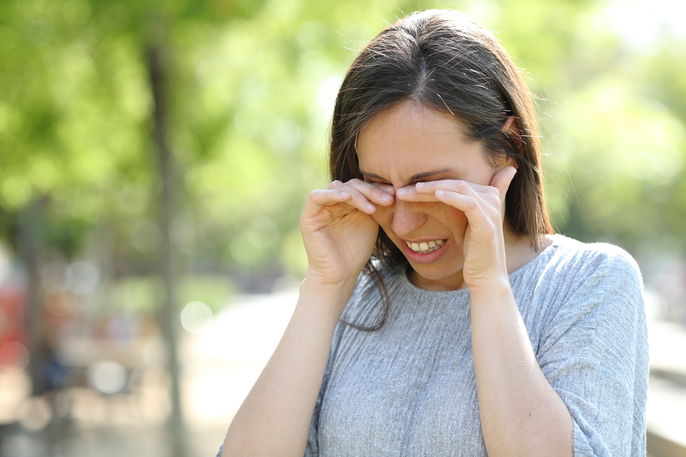Burning eyes can be caused by exposure to dust, wind or smoke, conjunctivitis, dry eye syndrome, blepharitis, photokeratitis or sinusitis. It can also be a sign of vision problems, such as myopia, astigmatism or presbyopia.
In addition to burning eyes, other symptoms may occur, such as swollen eyes, itching, redness and eye irritation.
It is important to consult an ophthalmologist if the burning eyes does not improve over time or when other symptoms appear. This way the doctor can identify the underlying cause and recommend the most appropriate treatment.

Why are my eyes burning?
The main causes of burning eyes are:
1. Exposure to dust, wind or smoke
A very common cause of burning eyes is exposure to dust, wind or contact with smoke from a barbecue or cigarette. These situations can drying out the eyes, causing a burning and red sensation. The eyes will also increase tear production to help to clean the surface and remove any irritating substances that may be causing this discomfort.
What to do: Apply 2 to 3 drops of saline solution into each eye to improve drying and treat burning. Washing your face with cold water also help.
2. Vision problems
Vision problems such as myopia, astigmatism or presbyopia can also lead to burning eyes. Other symptoms associated with these conditions include blurry vision, headache, or difficulty reading small print.
What to do: You should book an appointment with an ophthalmologist for a vision test to confirm whether any abnormalities or losses are noted. Treatment may involve the use of glasses or eye drops.
3. Dry eye syndrome
Dry eye syndrome mainly affects people who work for long hours in front of a computer. This can reduce blinking frequency and ead to dry eyes and burning.
This condition can also be the result of dry weather. Low air humidity can make the eyes more sensitive and cause a feeling of sand in the eyes and difficulty reading at night.
What to do: Be conscious of blinking when you're at the computer for long periods. You may also find saline solution or hydrating eye drops to hydrate beneficial for keeping your eyes more moist.
4. Dengue
In some cases, dengue fever can cause burning eyes, although the most common eye symptom is pain, specifically in the back of the eyes. This infection can also cause symptoms like generalized body aches, fatigue and low energy.
Also recommended: Common Dengue Symptoms: Classic & Hemorrhagic tuasaude.com/en/dengue-symptomsWhat to do: If you suspect you may have dengue fever, you should see urgent medical attention. The doctor will recommend increase fluids and rest, is a strong suspicion of dengue fever, it is important to go to the doctor to confirm the diagnosis, in addition to drinking plenty of water and and may prescribe dengue medications to speed-up recovery.
5. Sinusitis
Sinusitis is characterized byan inflammation of the nasal sinuses. It an cause burning eyes, as well as a runny nose, headaches, sneezing and difficulty breathing.
Also recommended: Chronic Sinusitis: Symptoms, Diagnosis, Causes & Treatment tuasaude.com/en/chronic-sinusitisWhat to do: It is important to see a family doctor for assessment and diagnosis. Bacterial sinusitis may require medication to help eliminate the infection, which will help to reduce eye burning. Learn about other sinusitis medication that your doctor may prescribe.
Also be sure to check out natural treatment for sinusitis that you can use to complement your prescribed treatment.
6. Allergic conjunctivitis
Allergic conjunctivitis can cause symptoms such as eye redness and pain, as well as swelling and a feeling of sand in the eyes. It can be triggered by pollen, animal dander or dust, and generally affects people susceptible to allergies or people with rhinitis or bronchitis.
What to do: Placing cold compresses on your eyes can help reduce discomfort. Another good tip is to regularly wash your eyes with saline solution to remove any triggering substances. See other home remedies for pink eye that you can use to reduce eye burning and other symptoms.
7. Blepharitis
Blepharitis is inflammation on the edge of the eyelids that leads to the appearance of dark circles, eye crust, eye redness, itching, a feeling of something in the eye and burning.
What to do: It is important to cleanse your eyes with appropriate eye drops and to remove any crusting or discharge with saline solution. You can apply a warm water compress 2 to 3 minutes, about 3 to 4 times a day to reduce irritation.
8. Photokeratitis
Photokeratitis is a disease that occurs due to excessive eye exposure to the sun or artificial UV rays. It can cause burning eyes, blurred vision, tears, a feeling of sand in the eyes and light sensitivity.
What to do: photokeratitis can resolve on its own without any specific treatment. However, you can relieve symptoms by apply cold compresses to the eyes and using artificial tears. If the symptoms of photokeratitis persist, you should see an ophthalmologist for more targeted treatment.
When to see a doctor
An ophthalmologist or general practitioner should be consulted if you have signs and symptoms like:
- Intense eye itching
- Intense burning that makes it difficult to keep the eyes open
- Difficulty seeing
- Blurry vision
- Constant tearing
- Blemishes in the eyes
These symptoms may indicate more serious situations, like an nfections, which may require more specific medications prescribed by a doctor.





























